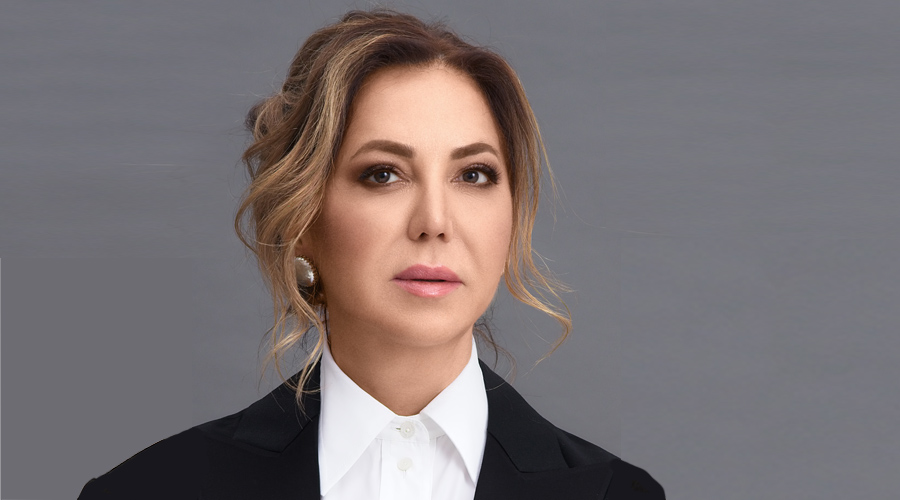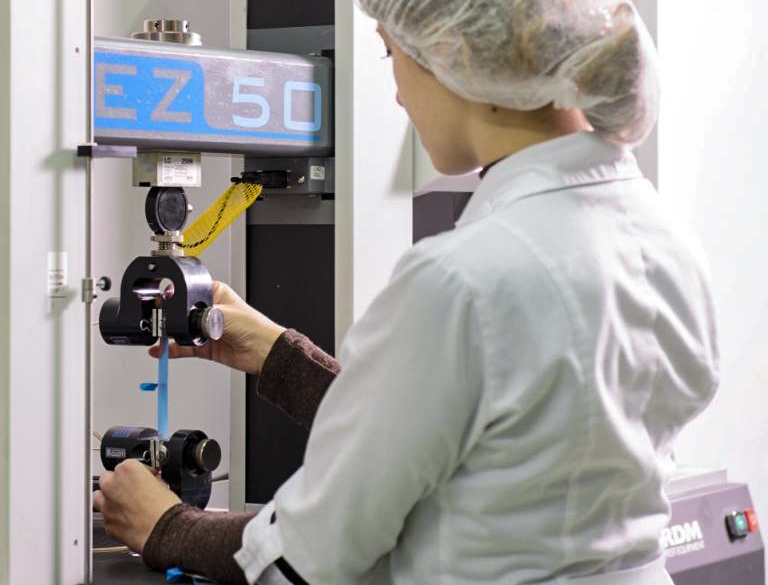
IMMER Group is one of the world’s largest producers of flexible packaging materials, films and labels. Its group of companies includes IMMER Ukrplastic, IMMER Digital and IMMER Design Studio. Ukrplastic is the largest manufacturer of its kind in Central and Eastern Europe, providing a full production cycle for manufacturing flexible polymer materials that can be used in the food, cosmetic, pharmaceutical and other industries. As an exporter to 35 countries, it meets international and EU standards and both its products and production methods are verifiably environmentally friendly. Here, Irina Mirochnik, president of IMMER Group and one of Ukraine’s most influential women, explains the group’s commitment to constant improvement and innovation, what gives it a competitive edge and its relationship to Germany
You first took up an executive positive in Ukrplastic in 1997. What was your vision when you took up this post?
In 1997, I became the chairperson of the supervisory board and my husband was the CEO of the company. We started with changing the ideology of the company and began to develop it again from zero. 1997 was the year when we got all of our contracts with the major global suppliers. Together with the World Bank and the International Bank for Reconstruction and Development (IBRD), we created a strategy to develop the packaging industry in the territory of the former USSR. We had the experience by that time in industries including the food industry, and we started bringing the plans to fruition.
How have you worked with German partners over the years?
We have worked with some of the most important German companies over the years. Since 1997, we have also been working on R&D with German partners such as BASF and we have created many innovative materials in our industry. This partnership is natural because Germany has one of the highest levels of technological and scientific development. In my opinion, there are many common psychological features between Germans and Ukrainians. We always feel mutual understanding.
You said the collaboration with Germany in R&D was natural. Why was IMMER Group the perfect partner for German companies?
Ukrplastic is attractive from German companies because we put a lot of research and development into the company – it’s a top priority. Every year, we spend 1.5 percent of our annual sales to fund R&D. On the other hand, we constructed our business on a European model of social responsibility. We got our first international certifications in 1998 and since then we keep developing our business and getting other international certificates. Our business and corporate responsibility approach are advantages that are also attractive for our international partners. We have a similar ideology, goals and values.
Can you confirm that IMMER Group also recently moved into several European countries?
Yes, in 2004 we started in Czechia from a logistic and trade company, and in 2016 we opened a new factory in Latvia with absolutely new and progressive technologies. The production and technical facilities allow personalized packaging by producing an unlimited number of unique, high-quality designs. We also opened several other trading companies in the EU.
What is an example of the group’s innovative products or solutions?
Around 1999-2000 we created a new material under the tradename of Twispan that can be used for candy wrappers. Before that, most candies were packed in paper or PVC, which was eventually fully banned first in Europe and today it is also banned in Ukraine. But our new material provided and still provides superior protection and preservation of the candy and is also very efficient in terms of machinability and sustainability. It consumes much less in the production process and can be recycled. Plus our Twispan has molecular memory. This was an innovation that we did together with BASF.

Lately, plastic has been seen as problematic for the environment. What other sustainable solutions do you offer as alternatives for plastic?
Let’s separate disposable packages and flexible packaging. Flexible packaging can be used for food and home care products, dry building mixes, as well as pharmaceutical products. On the other hand, the usage of disposable bags should have been banned a long time ago, it adds no value to the product, it does not help the product to sell, it does not increase its shelf life, it does not protect the consumer and does not perform the safety function. It basically does nothing. Its usage is more than questionable.
Packaging must add value. Packaging should be necessary and adequate, it should preserve the product, it must provide safety to the consumer and it should properly inform the buyer about what the product is.
This idea that plastic is the enemy is popular, but we shouldn’t forget that a major negative environmental practice is food waste. Throughout the world, more than 30 percent of food goes bad because of incorrect growing, processing, delivery, handling and storage. Flexible storage should be properly used and its core functions are keeping the products safe and extending shelf-life.
The United Nations’ Save Food Initiative is all about this, and we are the official representatives of the initiative in Ukraine. Regarding the environmental impact and environmental sustainability of our products, we, together with our partners, continue to produce flexible packaging to make sure that it is fully recyclable, compostable and biodegradable. We are a member of the Flexible Packaging Association (FPA), which directs a lot of resources to the implementation of the CEFLEX project and has a mission to develop the ways of separating, collecting and recycling the packaging waste. A lot of research and science is involved in this and there has been a lot of investment in it by us and other companies.
Let’s talk more about IMMER Group and the investment into technological modernization. You have invested quite a lot already. Does the company have plans for additional investments?
Yes, we are constantly investing in equipment and R&D. The purpose of our investments in Ukraine are currently mostly related to our agribusiness-related products. We can produce and create many varieties of products using our equipment. And we realize that we can make important contributions in terms of developing agribusiness in Ukraine.
And are you open to partnering with German companies to further develop your company into agribusiness?
Yes, there is room for new partnerships if our ideology and interests correspond. In the past, we have had various types of partnerships such as those in R&D, in developing certain projects, and partnerships with financial parties such as banks.
How has the Deep and Comprehensive Agreement with the EU affected your business so far?
When the agreement was signed between the EU and Ukraine it was very important for us and for the country. First of all, it was very significant that Ukraine started to implement European law with certain deadlines. It was important for the people of Ukraine, for the country itself and for our partners. If you ask whether we feel new advantages from the agreement itself to develop into Europe, we don’t feel that much because hardly anything has changed in customs duties. However, it’s great that more German investors are investing in various sectors in Ukraine. It’s positive because they can pass on their cultural values and help develop the country’s potential. Take for example our partner BASF, which has worked to help improve legislation in Ukraine.
What still needs to be done to improve two-way business between Ukraine and Germany?
First, we should adjust legislation faster. This question is always on the agenda and we’re always thinking of how to address gaps in legislation. More regulation around food and food products can be addressed. Another major issue that Ukraine is a country of fakes. In certain sectors, up to 40 percent of products are pure counterfeits. The public is still too relaxed about the issue. They don’t consider it an issue, but it’s the task of Ukraine to change the mentality and perceptions around this.
From a logistics point of view, you can deliver flexible packaging to 35 countries, you have eight warehouses in 11 counties. You can also deliver on design services, brand protection, R&D and different technologies as well. What other factors make your group stand out from its competitors?
All of our competitors have different qualities and features. What differentiates us is that we are much faster at creating new products. The world changes rapidly and in these circumstances, we are much faster at creating and implementing new products. We cooperate with the core R&D centers of each of our counterparts worldwide. We operate all the technologies and we have full vertical integration, which is very important.
What are some of the big companies you work with?
Nestle, JDE, Mondelez, Orkla and Coca Cola are some examples.
You were ranked 25th on a list of the 100 Most Influential Women in Ukraine by Focus Magazine. What would be your advice for other young women who want to get into business in Ukraine?
Work, work, work. I think that’s the secret, and you must be able to communicate with a lot of people and not be afraid to ask questions or to sound stupid. There is no stupid question; nobody knows everything and it’s often the case that what appears to be the stupidest question can actually get to the heart of the issue. It has happened to me.
But never forget, not even for a minute, that you are a queen, a beauty and a woman! And always find time for yourself.
Also, there’s not enough time in the day. This is another challenge.
And then, there’s the woman in power factor. In some countries (in Oriental countries, in particular), men are considered superior to women, attitudes differ, and it’s not a challenge but you have to keep it in mind. Don’t be afraid to communicate and to learn a lot, work a lot, and talk to new people who are much more experienced than you. The people who are at the top positions in the world are usually also pretty simple and happy to share their experiences.
And finally, always keep in mind that your personal life and business life should be separate.
Do you have a final message for German investors and policy-makers about Ukraine today?
Given the experience and capacity of potential German investors and also the vast amount of opportunities that are now open in Ukraine, there are so many ways to spread their business throughout Ukraine today and reach 43 million consumers.
Ukraine has a highly educated population that has a lot of energy and a strong desire to work. For a German company, coming to Ukraine is about sharing experiences, spreading mentality and creating new business opportunities.